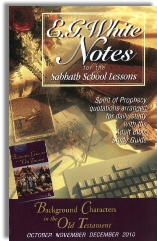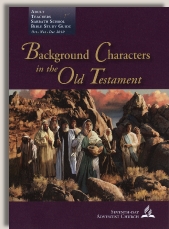|
||||||||||||||
Commentary on "Uriah: Faith of a Foreigner"
Day 1: Sabbath Afternoon, October 30, 2010 - Introduction
Overview
“Love your God with all your heart and strength” is the memory verse for this week’s lesson about Uriah, a shadowy figure beside David. It sets the tone for the entire lesson, affirming the terms of comparison between these two biblical actors. Posing a moral dilemma related to receiving too much change for a train ticket and the ensuing ethical consideration off whether or not to return it and possibly miss the train, the introduction explicitly declares the lesson’s theme to be “a powerful contrast of ethics” between David and Uriah. Uriah’s good works magnify the wickedness of David’s works; “his [Uriah] unfortunate fate can teach us what it means to live out one’s faith as opposed to just talking about it”.
Observations
There is an unusual element in this introduction found in the last phrase: “Though we aren’t told much about Uriah, what we discover of him and his unfortunate fate can teach us what it means to live out one’s faith as opposed to just talking about it.”
This sentence is ambiguous; the lesson does not establish the supposed differences between David and Uriah’s faith. Are the authors of the lesson going to present Uriah’s faith “lived out” as a true faith in contrast with David’s supposedly “false faith” manifested only in lip service? Or are they assuming that for a while, David’s deeds didn’t match his profession of faith, that his life was undistinguished from the life of an unbeliever?
According to Adventist theology, believers living in known sin as David did in the episode with Uriah lose their status of being true believers. They lose their justified status, they are no longer saved, they need to be saved again. While evangelical Christianity affirms justification as a one-time event, unchangeable, irreversible, not a repeatable event, the Adventists reject this life-saving character of justification, making it dependent on the believer’s sanctification. According to this view, David lost his justification, and not only his acts were not in harmony with his profession of faith, but his acts proved that he was no longer a true believer until he repented of his sins with Uriah and Uriah’s wife.
From this perspective, David must be seen temporarily as an unbeliever who just talked about his faith during the period of his sin. His life, according to this view, cannot be taken as a manifestation of God’s grace toward a true believer. God’s gracious providence toward his disobedient children in times of their rebellion is completely out of picture. Instead of seeing the history of redemption as a continual exposition of God’s grace, the narrative and contrast between David and Uriah is a contrast of morals proving their faith. It is merely talking about their hearts, not talking about God’s faithfulness to his promise of grace. There is no comfort for the disobedient children of God in David’s sin, no assurance that God will turn even the sins of God’s children into blessings for them. There is no reassurance that nothing can prevent God from saving his children, not even their sins, that God can save to the uttermost. This lesson is only a moral lesson, and God’s grace is seen as entirely dependent and conditional on man’s repentance.
Copyright 2010 BibleStudiesForAdventists.com. All rights reserved. Revised October 29, 2010. This website is published by Life Assurance Ministries, Glendale, Arizona, USA, the publisher of Proclamation! Magazine. Contact email: BibleStudiesForAdventists@gmail.com.
The Sabbath School Bible Study Guide and the corresponding E.G. White Notes are published by Pacific Press Publishing Association, which is owned and operated by the Seventh-day Adventist church. The current quarter's editions are pictured above.
Official Adventist Resources
Standard Edition Study Guide Week 6
Teacher's Edition Study Guide Week 6
Easy Reading Edition Study Guide Wk 6
Search the Complete Published Ellen G. White Writings


